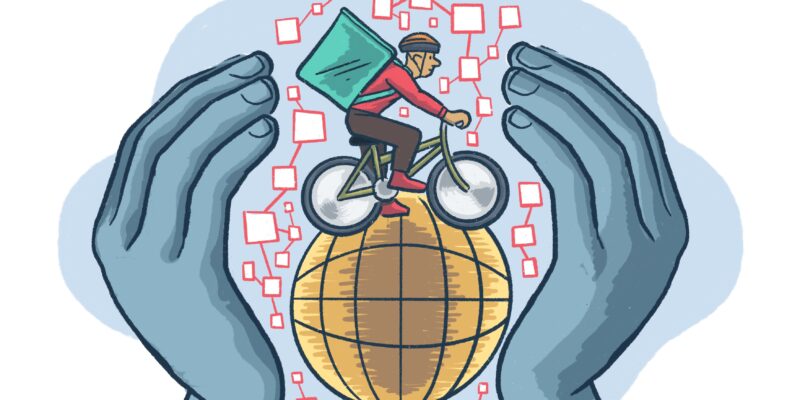
The gig economy is a type of work arrangement where individuals perform short-term or freelance jobs or “gigs” for various clients or employers. In the gig economy, workers are often independent contractors, rather than traditional employees, and use online platforms or mobile apps to find and complete work.
Examples of gig work include driving for ride-sharing services like Uber or Lyft, delivering groceries or packages for companies like Instacart or Amazon, providing freelance graphic design or writing services, and performing small tasks or odd jobs through platforms like TaskRabbit or Fiverr.
The gig economy has grown in popularity in recent years due to its flexibility and the ability to earn income on a part-time or full-time basis without the constraints of a traditional 9-to-5 job. However, gig workers may not have access to traditional employee benefits such as health insurance or retirement plans, and may be responsible for their own taxes and expenses. Additionally, the nature of gig work can be unpredictable, with no guarantee of steady income or job security.
Working in the gig economy can offer flexibility and the ability to earn income on your own terms. However, it’s important to understand the unique challenges and considerations that come with this type of work. Here are some key things to know about working in the gig economy:
- Income and taxes: Gig workers are generally considered independent contractors, which means they are responsible for paying their own taxes and may not have access to traditional employer benefits like health insurance and retirement plans. Make sure to set aside a portion of your income for taxes and consider working with a tax professional to ensure you are properly reporting and paying your taxes.
- Job security: Gig work is often project-based or temporary, which means there may not be a guaranteed source of income or job security. Consider building a diverse portfolio of gig work or supplementing with other sources of income to help ensure financial stability.
- Flexibility and control: One of the benefits of gig work is the ability to choose your own hours and work on your own terms. However, this also means that you are responsible for managing your workload and maintaining a healthy work-life balance.
- Safety and liability: Depending on the type of gig work you do, there may be risks associated with working independently, such as driving for a ride-sharing service or performing physical labor. Make sure to take steps to protect yourself and your assets, such as carrying adequate insurance coverage.
- Reputation and reviews: Many gig platforms rely on customer reviews and ratings to determine which workers are assigned to jobs. Maintaining a positive reputation and consistently delivering high-quality work can help you secure more gigs and increase your earnings over time.
Overall, working in the gig economy can be a great way to earn income on your own terms, but it’s important to carefully consider the risks and challenges involved and take steps to protect yourself and your finances.
While working in the gig economy can offer many benefits, such as flexibility and the ability to earn income on your own terms, there are also some potential pitfalls to be aware of:
- Lack of stability and job security: Gig work can be unpredictable, with no guarantee of steady income or job security. As an independent contractor, you may not have access to traditional employee benefits such as health insurance, paid time off, or retirement plans.
- Income volatility: Gig workers may experience fluctuations in their income from month to month, depending on the demand for their services and the amount of work they are able to secure. This can make it difficult to budget and plan for the future.
- No employer protections: As an independent contractor, you may not be covered by certain labor laws and protections that traditional employees are entitled to, such as minimum wage and overtime laws.
- Isolation and lack of social connection: Gig work can be solitary, with little interaction with coworkers or a sense of belonging to a workplace community.
- Increased expenses and responsibilities: As an independent contractor, you may be responsible for your own expenses, such as equipment, transportation, and insurance. You may also be responsible for managing your own taxes and financial planning.
- Limited career growth: While some gig workers are able to build successful careers in the gig economy, others may find that their earning potential and opportunities for career advancement are limited.
Overall, it’s important to carefully weigh the benefits and drawbacks of working in the gig economy and consider whether this type of work aligns with your personal and financial goals.









